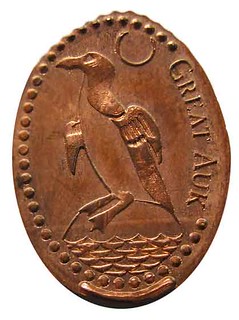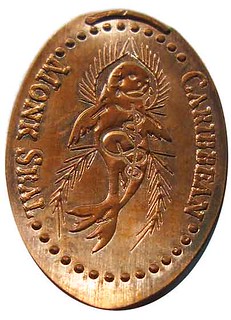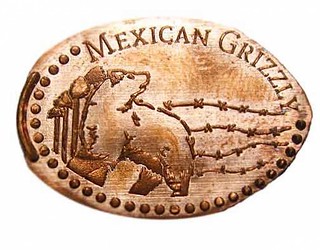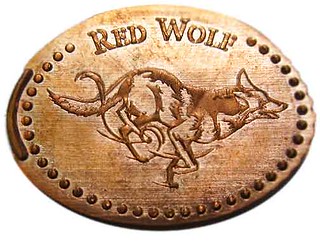
PREV ARTICLE
NEXT ARTICLE
FULL ISSUE
PREV FULL ISSUE
FAUNA: WILD ANIMAL ELONGATED CENTSDick Johnson passed along this article from the art world's Hyperallergic blog. Thanks. -Editor
For roughly the past 10 years, Pittsburgh-based artists Stuart Anderson and Shaun Slifer have been devising a far more punk rock penny machine: Fauna. Finding common ground in their desire to work against dominant progress narratives, the pair have subverted the standard penny machine to invite ideological questions about the nature of industry, memory, and ecological destruction and adaptation. Described by its progenitors as an “interactive kinetic sculpture,” the third and most current iteration of Fauna is a functional, built-from-scratch machine that presses two-sided pennies via a crank mechanism (a handsome ship’s wheel). For one side of the coin, users choose from nine either extinct or critically endangered animals, like the jaguar, red wolf, or passenger pigeon. Available for the flip side are nine sets of tracks, each representing a species of adapted urban wildlife, such as coyotes, raccoons, and groundhogs — what Anderson and Slifer referred to as “faunal weeds” in a recent telephone interview. The initial concept for Fauna came from Slifer, who has collected souvenir elongated pennies for years. The project became reality by way of Anderson’s considerable mechanical abilities — constructing a hand-powered machine capable of repeatedly, accurately reproducing 81 possible image combinations, on metal, is no small task. Since the pair first met in 2003, Anderson has received his PhD in robotics from Carnegie Mellon, driven, he writes on his website, by an overarching fascination with the “turbulent boundaries between formal models and natural systems.” For Fauna, he innovated a set of two die carriages (modeled on the standard industrial rolling mill), each bearing three wheels of three designs each. Though the 18 image options are original designs that Slifer solicited from fellow members of the Justseeds activist arts collective, Fauna is not intended to be shown at galleries. Instead, Slifer and Anderson hope to place the work within its “natural” setting of zoos and natural history museums — places “where people are already interacting with animals, either live or taxidermied,” Slifer said. The need for the user to choose among alternate dies answers my question of "Why didn't they just buy an old penny smashing machine?" With those the operator positions
the desired die (it's usually just one die); in this case the user chooses among multiple die combinations. Nice work. -Editor
To read the complete article, see:
Here's more from the project's web site. -Editor
 Created by Stuart Anderson and Justseeds member Shaun Slifer, the Fauna penny press is an interactive kinetic sculpture that creates an experience designed to catalyze thought about the role of humans in the natural world. Fauna uses the human desire to identify with wild animals to present questions about how extinction alters our concept of nature, how adaptation drives our ecological future, and how an animal’s symbolic and cultural value can determine its survival.
While the elongated penny originated in the 1890s, the practice of carrying coins as markers of identity, duty, or debt can be traced for thousands of years. The coins produced by Fauna give their bearers an opportunity to reflect on their personal relationship with wildness, extinction, and survival.   I like some of the designs much better than others - see more on the web site. It's hard to produce a great design in this medium, and what may work well in a sketch may not
translate well onto the coin. Regardless, these are a nice addition to the field. -Editor
To read the complete article, see:
Wayne Homren, Editor The Numismatic Bibliomania Society is a non-profit organization promoting numismatic literature. See our web site at coinbooks.org. To submit items for publication in The E-Sylum, write to the Editor at this address: whomren@gmail.com To subscribe go to: https://my.binhost.com/lists/listinfo/esylum All Rights Reserved. NBS Home Page Contact the NBS webmaster 
|

